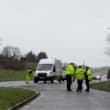Health Minister Robin Swann has outlined plans that will continue to tackle the harms caused to children and young people by tobacco and second-hand smoking.
He laid out his plans to prioritise and progress regulations on smoking in cars when children are present, as well as preventing the sale of nicotine inhaling products to those aged under 18.
Minister Swann said: “The use of tobacco continues to be a primary cause of preventable ill-health and premature death in Northern Ireland. It is vital that we maximise our efforts to reduce smoking prevalence and protect people, particularly children, from the effects of second- hand smoke.”
Legislation is already in place which bans smoking in certain premises, places and vehicles including on public transport and in work vehicles used by more than one person.
The proposed new regulations would extend the current smoke-free provisions to private vehicles where children are present, when there is more than one person in the car and the vehicle is enclosed. It is also proposed that failing to prevent smoking in a smoke-free private vehicle will be made an offence.
The Minister said: “Children and young people are more vulnerable to the harmful effects of second hand smoke as they breathe more rapidly and inhale more pollutants per pound of body weight than adults. The Royal College of Physicians has reported that this can lead to increased risk of asthma, lower respiratory infections, middle ear disease, bronchitis, bacterial meningitis and sudden infant death syndrome, as well as reduced respiratory function.
“These planned regulations will play an important role in protecting children from the harms of nicotine addiction and tobacco use. I anticipate that, subject to Assembly approval, these regulations will be operational early next year.”
The Minister has also laid out his plans to prevent the sale of nicotine inhaling products, such as e-cigarettes, to anyone aged under 18, under the Health Miscellaneous Provisions Act (NI) 2016. It will also be an offence to purchase such products on behalf of a child (a proxy purchasing offence). These offences mirror current offences relating to tobacco sales.
Minister Swann said: “Nicotine is highly addictive and, according to the World Health Organisation, exposure to nicotine whilst still in adolescence can lead to long-term consequences for brain development. In addition to the potential long-term health implications of e-cigarette use by teenagers, there are also concerns that they may act as a gateway into smoking.
“Youth smoking prevalence in Northern Ireland has been steadily decreasing in recent years, and I do not wish to see this trend reversed because young people, who may not have been induced initially to smoke tobacco, instead become addicted to nicotine through e-cigarettes.”
In conclusion, the Minister confirmed that the current Tobacco Control Strategy is to be extended.
“There have been a number of significant developments in the area of tobacco and nicotine control since the current strategy was introduced. As a result, a mid-term review was undertaken and work is ongoing to implement review recommendations. It is important that we allow sufficient time for the recommendations to be implemented. Therefore the current strategy will be extended for a further period of time. This will allow for actions to be taken forward that address the inequalities evident in tobacco use and the associated health outcomes.”
Currently enforcement of smoke-free legislation is the sole responsibility of district councils. The draft regulations relating to smoking in private vehicles propose that a dual enforcement approach between district councils and the PSNI is adopted in relation to all smoke free vehicles.
Enforcement authorities will have the option of issuing fixed penalty notices for offences in relation to smoking in a private vehicle in which children are present. It is proposed that the amount for both offences, ie smoking in a private smoke-free vehicle and failing to prevent smoking in a private smoke-free vehicle is £50. This mirrors the penalty for smoking in a smoke-free public or workplace vehicles. Decisions as to whether to issue warnings, fixed penalty notices or refer an alleged offence straight to the court will be at the discretion of the enforcement agency,
In relation to the offence of smoking in a smoke-free vehicle, it would be the person smoking who would be guilty of the offence. The age of the person smoking is irrelevant ie if the person smoking is under 18 and they are the only minor in the vehicle, as long as the vehicle is enclosed and another person is present, the person smoking will have committed an offence.
With respect to the offence of failing to prevent smoking in a private smoke-free vehicle, in all circumstances it will be the driver of the vehicle who would be guilty of the offence (as the person with responsibility for the vehicle while it is on the road).
Failure to pay a fixed penalty notice could result in the matter being referred to court. A person in receipt of a fixed penalty notice can also request a court hearing, On conviction of an offence of (i) smoking in a smoke-free vehicle, a court can award a fine to a maximum of level 3 on the standard scale (currently £1,000), and on conviction of an offence of failure to prevent smoking in a smoke-free vehicle, a court can award a fine to a maximum of level 4 on the standard scale (currently £2,500).
In relation to the age of sale of nicotine inhaling products, the 2019 Young Persons’ Behaviour & Attitudes Survey (YPBAS) reported that 3% of 11-16 year olds use e-cigarettes on a regular basis (at least once a week).
The enforcement of the regulations banning the age of sale to those under 18, and proxy purchasing of such products by an adult on behalf of a child, will be the responsibility of Tobacco Enforcement Officers in district councils
Enforcement authorities will have the option of issuing fixed penalty notices for either offence committed in relation to the sale of a nicotine inhaling product to a minor. It is proposed that the amount for both offences, ie selling a NIP to a person under 18 and the offence of proxy purchasing would be £250. This mirrors the penalties for comparable tobacco related offences. Failure to pay a fixed penalty notice could result in the matter being referred to a court. On conviction of either offence, a court can award a fine of up to a maximum of level 5 on the standard scale (currently £5000).
10. It is intended that section 3 (1) of the Health (Miscellaneous Provisions) Act (Northern Ireland) 2016 will also be commenced in conjunction with the regulations. This will integrate the sale of nicotine inhaling products into the existing enforcement regime relating to the persistent commission of tobacco offences. A person or a business found to be repeatedly selling NIPs to children could receive a Restricted Sales Order or a Restricted Premises Order from the court. Such an order can prohibit the sale of nicotine inhaling or tobacco products by a named individual or a business premises for up to 3 years.





